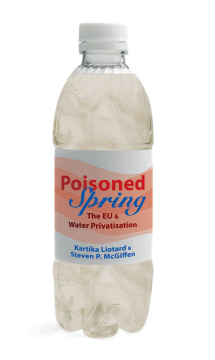
Additional Information
Book Details
Abstract
Vast numbers of people have no access to safe drinking water, and even more lack any kind of effective sanitation. Most of the world's water supply remains in public ownership. Neither drought nor flood is as much a meteorological phenomenon as it is the result of mismanagement. So is privatisation the route to solving this most urgent of problems?
The authors argue that, on the contrary, neoliberal economics and the power structures responsible for widening global inequalities are blocking the way to progress towards universal provision of safe water and effective sanitation. Behind these malign influences stands the growing power of the European Union and the corporations in whose interests it operates.
On the basis of an analysis of the political economy of water and of the European Union's policies, Poisoned Spring will place the problem of water supply in the broad context of corporate control of the world's resources.
Table of Contents
| Section Title | Page | Action | Price |
|---|---|---|---|
| Cover | Cover | ||
| Contents | v | ||
| Acknowledgements | vii | ||
| Acronyms and Abbreviations | viii | ||
| Introduction: A Dangerous Synergy | 1 | ||
| Climate Change | 5 | ||
| Drought and Water Scarcity | 6 | ||
| Extreme Weather Events | 7 | ||
| Bad Weather, Bad Politics, Catastrophic Economics | 8 | ||
| The Problem of Uncertainty | 10 | ||
| Water, Health and Development | 12 | ||
| The European Union and the Politics of Water | 12 | ||
| A Call to Activism | 15 | ||
| Structure of the Book | 16 | ||
| 1. Drought and Deprivation | 19 | ||
| Defining Drought | 19 | ||
| How Much Water Do We Need? | 23 | ||
| Population Growth and Drought | 25 | ||
| Urbanisation and Drought | 31 | ||
| Pollution as a Source of Water Shortage | 32 | ||
| Climate Change and Drought | 35 | ||
| The Environmental Effects of Drought | 35 | ||
| The Socio-economic Consequences of Drought | 39 | ||
| Planning for Drought | 45 | ||
| Desertifi cation | 47 | ||
| 2. Flood | 50 | ||
| The Environmental Consequences of Flood | 52 | ||
| The Socio-economic Consequences of Flood | 54 | ||
| Flood Control – Good, Bad and Indifferent | 58 | ||
| Physical Barriers – the Case of the Netherlands | 63 | ||
| Dams | 68 | ||
| Adaptation and the Non-structural Approach | 71 | ||
| 3. Conflict and Cooperation | 74 | ||
| Water Wars? | 78 | ||
| Public Ownership | 81 | ||
| Benefits of Cooperation | 85 | ||
| Treaties and Agreements | 87 | ||
| Beyond the Treaty | 93 | ||
| 4. It Never Rains But it Pours: Climate Change, Water Shortage and Flood | 96 | ||
| Water Quality | 98 | ||
| Increased Costs | 101 | ||
| North and South | 103 | ||
| Supply-side Measures | 105 | ||
| Reducing Waste | 108 | ||
| Reducing Demand from Agriculture | 109 | ||
| Tackling Climate Change | 113 | ||
| 5. The European Union Within its Borders: Why Privatisation? The Ideology Behind the Theft of Public Property | 121 | ||
| How Ideology Becomes Practice:The EU Legal Framework and the Drive to Privatisation | 127 | ||
| EU Finance | 136 | ||
| Some Experiences of Privatisation in the EU | 138 | ||
| The Picture in the Rest of the EU | 157 | ||
| Conclusion | 158 | ||
| 6. The European Union Within its Borders, Part 2: The Water Framework Directive | 161 | ||
| Drought and Water Scarcity | 179 | ||
| Flood | 187 | ||
| What Should be Done? | 192 | ||
| 7. The European Union Beyond its Borders | 195 | ||
| The Ideological Front | 202 | ||
| Public–Private Infrastructure Advisory Facility (PPIAF) | 211 | ||
| BizClim and the Private Sector Enabling Environment Facility | 215 | ||
| Public Alternatives | 217 | ||
| 8. A Better Water Policy is Possible | 219 | ||
| Bibliography | 227 | ||
| Books | 227 | ||
| Official, Academic, Trade Union and NGO Reports | 228 | ||
| Papers, Articles, Pamphlets and Presentations | 237 | ||
| Notes | 240 | ||
| Index | 259 |
